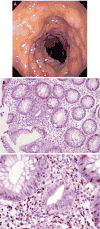Tumor regression and autoimmunity in patients treated with cytotoxic T lymphocyte-associated antigen 4 blockade and interleukin 2: a phase I/II study
- PMID: 16283570
- PMCID: PMC1473970
- DOI: 10.1245/ASO.2005.03.536
Tumor regression and autoimmunity in patients treated with cytotoxic T lymphocyte-associated antigen 4 blockade and interleukin 2: a phase I/II study
Abstract
Background: Cytotoxic T lymphocyte-associated antigen (CTLA)-4 can inhibit T-cell responses and is involved in tolerance against self antigens. We previously reported autoimmune manifestations and objective cancer regressions in patients with metastatic melanoma treated with CTLA-4 blockade. The possibility of activating tumor-reactive T cells while removing inhibitory activity with CTLA-4 blockade has stimulated interest in using anti-CTLA-4 antibodies in combination with other cancer immunotherapies to improve clinical outcomes. In this study, we assessed the antitumor activity and autoimmune toxicity of CTLA-4 blockade in combination with an immune-activating stimulus, interleukin (IL)-2, in patients with metastatic melanoma.
Methods: Thirty-six patients received anti-CTLA-4 antibody every 3 weeks. Three patients per cohort received doses of .1, .3, 1.0, and 2.0 mg/kg. Twenty-four patients received 3.0 mg/kg. All patients received IL-2 therapy (720,000 IU/kg every 8 hours to a maximum of 15 doses).
Results: Eight patients (22%) experienced objective tumor responses (three complete and five partial), including metastases in the lungs, lymph nodes, mediastinum, and subcutaneous tissues. Six of the eight patients have ongoing objective responses at 11 to 19 months. Five patients (14%) developed grade III/IV autoimmune toxicities secondary to anti-CTLA-4 administration, including four patients with enterocolitis and one with arthritis and uveitis.
Conclusions: There is not evidence to support a synergistic effect of CTLA-4 blockade plus IL-2 administration, because the 22% objective response rate is that expected from the sum of these two agents administered alone. Durable cancer regressions were seen in patients treated with this combination.
Figures






Comment in
-
Tumor regression and autoimmunity in cytotoxic T lymphocyte-associated antigen 4 blockade-treated patients.Ann Surg Oncol. 2005 Dec;12(12):957-9. doi: 10.1245/ASO.2005.08.917. Epub 2005 Oct 26. Ann Surg Oncol. 2005. PMID: 16244797 No abstract available.
Similar articles
-
Tumor regression and autoimmunity in cytotoxic T lymphocyte-associated antigen 4 blockade-treated patients.Ann Surg Oncol. 2005 Dec;12(12):957-9. doi: 10.1245/ASO.2005.08.917. Epub 2005 Oct 26. Ann Surg Oncol. 2005. PMID: 16244797 No abstract available.
-
Autoimmunity correlates with tumor regression in patients with metastatic melanoma treated with anti-cytotoxic T-lymphocyte antigen-4.J Clin Oncol. 2005 Sep 1;23(25):6043-53. doi: 10.1200/JCO.2005.06.205. Epub 2005 Aug 8. J Clin Oncol. 2005. PMID: 16087944 Free PMC article. Clinical Trial.
-
Melan-A-specific cytotoxic T cells are associated with tumor regression and autoimmunity following treatment with anti-CTLA-4.Clin Cancer Res. 2009 Apr 1;15(7):2507-13. doi: 10.1158/1078-0432.CCR-08-2424. Epub 2009 Mar 24. Clin Cancer Res. 2009. PMID: 19318477 Clinical Trial.
-
CTLA-4 blockade with monoclonal antibodies in patients with metastatic cancer: surgical issues.Ann Surg Oncol. 2008 Nov;15(11):3014-21. doi: 10.1245/s10434-008-0104-y. Epub 2008 Aug 21. Ann Surg Oncol. 2008. PMID: 18716842 Review.
-
Next generation of immunotherapy for melanoma.J Clin Oncol. 2008 Jul 10;26(20):3445-55. doi: 10.1200/JCO.2007.14.6423. J Clin Oncol. 2008. PMID: 18612161 Review.
Cited by
-
Out-of-Sequence Signal 3 Paralyzes Primary CD4(+) T-Cell-Dependent Immunity.Immunity. 2015 Aug 18;43(2):240-50. doi: 10.1016/j.immuni.2015.06.023. Epub 2015 Jul 28. Immunity. 2015. PMID: 26231116 Free PMC article.
-
A retrospective analysis of High-Dose Interleukin-2 (HD IL-2) following Ipilimumab in metastatic melanoma.J Immunother Cancer. 2016 Sep 20;4:52. doi: 10.1186/s40425-016-0155-8. eCollection 2016. J Immunother Cancer. 2016. PMID: 27660706 Free PMC article.
-
Ipilimumab pharmacotherapy in patients with metastatic melanoma.Clin Med Insights Oncol. 2012;6:275-86. doi: 10.4137/CMO.S7245. Epub 2012 Jul 30. Clin Med Insights Oncol. 2012. PMID: 22904648 Free PMC article.
-
A phase II multicenter study of ipilimumab with or without dacarbazine in chemotherapy-naïve patients with advanced melanoma.Invest New Drugs. 2011 Jun;29(3):489-98. doi: 10.1007/s10637-009-9376-8. Epub 2010 Jan 16. Invest New Drugs. 2011. PMID: 20082117 Clinical Trial.
-
Immune modulation by melanoma and ovarian tumor cells through expression of the immunosuppressive molecule CD200.Cancer Immunol Immunother. 2008 Jul;57(7):987-96. doi: 10.1007/s00262-007-0429-6. Cancer Immunol Immunother. 2008. PMID: 18060403 Free PMC article.
References
-
- Lenschow DJ, Walunas TL, Bluestone JA. CD28/B7 system of T cell costimulation. Annu Rev Immunol. 1996;14:233–58. - PubMed
-
- Schwartz RH. A cell culture model for T lymphocyte clonal anergy. Science. 1990;248:1349–56. - PubMed
-
- Gross JA, Callas E, Allison JP. Identification and distribution of the costimulatory receptor CD28 in the mouse. J Immunol. 1992;149:380–8. - PubMed
-
- Lindsten T, Lee KP, Harris ES, et al. Characterization of CTLA-4 structure and expression on human T cells. J Immunol. 1993;151:3489–99. - PubMed
Publication types
MeSH terms
Substances
Grants and funding
LinkOut - more resources
Full Text Sources
Other Literature Sources
Medical

